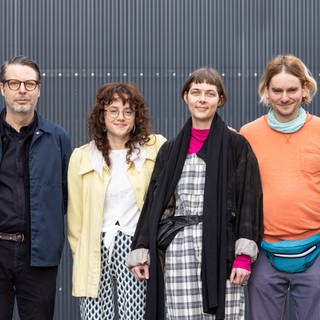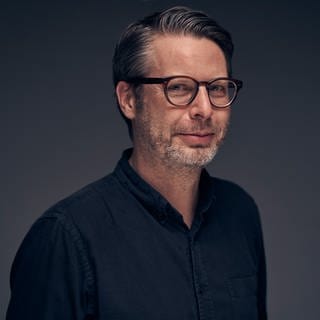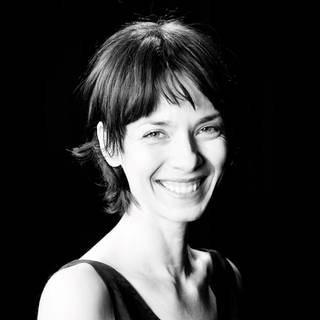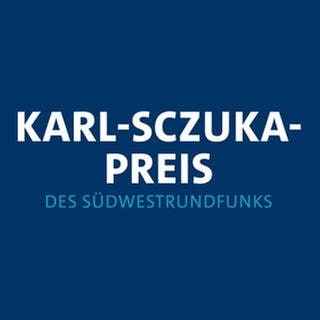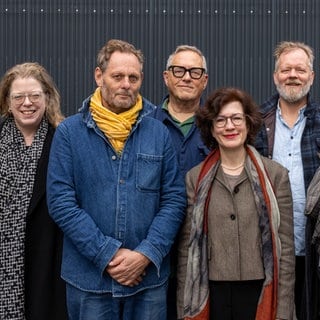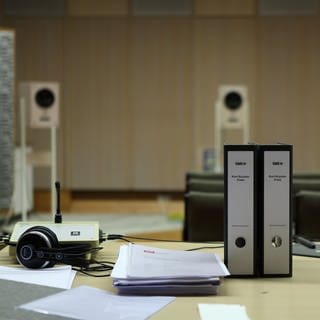Karl Sczuka Research Scholarship in collaboration with the Goethe-Institut.
Interplays of outside and inside – of physical, architectural and sonic spaces – characterize the audio piece CHOLERA – I THOUGHT I SHOULD NEVER SPEAK AGAIN (2021).
Responding to the RHO collective’s collaborative request to add voice to their light installation at the Kasseler Kunstverein, voice artist Elisa Kühnl conducted intimate 1:1 recording sessions in the winter of 2021 with six members of the vocal ensemble Γλώσσα (Glossa), which she founded in 2020. The chorus members followed action instructions from Elisa Kühnl to give vocal and physical expression to the titular theme of choleric temperament – dry, hot, rage, yellow bile. These recordings were then combined by both collectives into a one-hour vocal composition and transferred to a setup of 33 spotlights and a digital control system. The multi-channel light/sound installation was on view at the Kasseler Kunstverein from Feb. 15 to March 14, 2021. During the lockdown, the audience could only perceive the installation from the outside through windows left ajar.
The audio piece CHOLERA – I THOUGHT I SHOULD NEVER SPEAK AGAIN interweaves the original composition of the installation with documentary recordings from inside the Kasseler Kunstverein and its external surroundings. It unravels a narrative about spaces, proximity and distance. Inside and outside exist here on several levels: there is the inside of the Kunstverein’s premises, which was documented by RHO several times with different microphone setups (including spherical microphones, stereophony, boundary microphones) on a total of 14 tracks. Here, in addition to the vocal composition and the room acoustics, the switching noises of the spotlight control and the buzzing of the computers become audible. The outside in front of the Kunstverein was documented with OKM recordings. Depending on the listening position, the sounds of voices mix with traffic, reactions of passers-by to the installation, bird noises and melting snow. Or they even disappear altogether. The path into the interior space continues with the raw recordings from inside the studio, which could never sound so dry in the on-site installation. Last but not least, the inside of the body – the mouth, throat, vocal chords, the lungs, the belly – gives these recordings their effect and leads to a highly personal, physical interior that is just as inaccessible as the exhibition space.

Installation design and setup: RHO
Score voice: Elisa Kühnl
Singers*: Friedemann Dupelius, Tanja Kodlin, Elisa Kühnl, Ella Posny, Sophia Schach, Marcus Zilz
Composition: Josephine Stamer*, RHO
Audio recordings: Friedemann Dupelius*, Eeva Ojanperä, RHO, Marcus Zilz*
Editing: Wednesday Dupont aka Friedemann Dupelius
Mastering: Marcus Zilz at Mount Wobble
* Γλώσσα (Glossa)
RHO collective
RHO shape spaces like walk-in sculptures. Thinking in terms of bodies, images, atmospheres, light and darkness has informed their work since 2017. Their preoccupation with ancient philosophy and natural science provides them with themes and friction surfaces for their distinctive, immersive spatial installations. Most recently, it was the theory of temperaments, which they categorized inside spaces and transcribed with pictorial means. They recently opened their practice towards sound art through the collaboration with the vocal ensemble Γλώσσα (Glossa) in the work CHOLERA – I THOUGHT I SHOULD NEVER SPEAK AGAIN, which was on view at the Kasseler Kunstverein in early 2021. Most recently, they collaborated with the collective Studio Beisel to present the walk-in immersive spatial installation HOLOBIONT/ ГОЛОБІОHТ, which was part of the documenta15 supporting program. The collective remains pseudonymous, because for RHO it is not about the specific authorship, but about the individual work of art.
Instagram: https://www.instagram.com/rho_kollektiv/similar_accounts/
Website: https://rhokollektiv.org/
Γλώσσα (Glossa)
The Γλώσσα (Glossa) choir, consisting of up to 30 people, explores the sonic potentials of individual voices, works on developing its own sound language, and designs and realizes its own scores. Since the beginning of 2020, new, surprising and sometimes disconcerting moments are constantly created, through a collective choral practice. The focus on the voice also includes an interest in exploring the extent to which the human voice, despite everyday use, is still burdened with shame, obeys certain sets of rules, and is subject to stereotypes. The Γλώσσα project opens up a space for the choir participants (amateurs and professional musicians) to experimentally discover their individual voices – and, of course, to be quirky, loud, crooked and unfamiliar. The voice functions here as a primary experimental object, but the actual research focus of the project lies in the unfolding degrees of freedom of common vocal practice and the establishment of a connecting space. The voice as an extremely variable instrument for the investigation of given circumstances and as a trigger for the emergence of a social construct.
